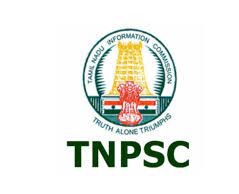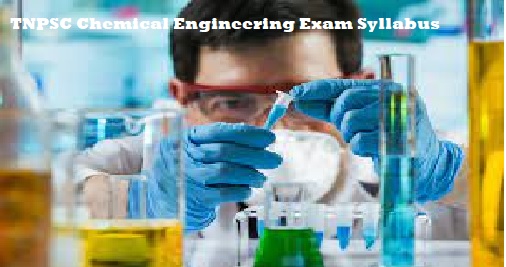TNPSC Chemical Engineering Exam Syllabus : Tamil Nadu Public Service Commission
Organisation : Tamil Nadu Public Service Commission (TNPSC)
Exam Name : TNPSC Chemical Engineering Examination
Standard : UG Degree Standard
Subject Code : 260
Announcement : TNPSC Chemical Engineering Exam Syllabus
Website : https://www.tnpsc.gov.in/English/new_syllabus.html
TNPSC Chemical Engineering Exam Syllabus
The TNPSC Chemical Engineering Exam Syllabus are given below,
Related / Similar Syllabus : TNPSC Computer Science Engineering Exam Syllabus

UNIT I: Chemical Process Calculations And Chemical Engineering Thermodynamics
Properties of gases liquids and solids, Humidity and saturation, Gas laws, Material and Energy balances- involving recycle, by pass and purge systems, Material and Energy balance with reactions. Thermodynamics functions – Chemical and Phase Equilibrium – Laws of Thermodynamics – Ideal and non-ideal gases and solutions – fugacity, partial molal properties.
UNIT II: Mechanical Operations & Engineering Materials
Size Reduction, law, particle size Analysis, Mixing and agitation, Filtration, Sedimentation and Settling, Materials of construction for chemical Industries, Metallic, Non-metallic and Polymeric materials, corrosion. Grinding, Law. Smart materials for Chemical Engineering applications.
UNIT III: Chemical Technology & Renewable Energy Sources
Acids, Fertilizers, marine Chemicals, Cement, Glass, Ceramic and Refractories.Petroleum Refining Products, Fermentation Products, Oils, Soaps and Detergents, Pulp and paper, Dyes, sugar, leather and rubber. Potential for energy resources, energy conversion, solar, thermal, photoelectric, ocean, geothermal, wind energy, bio-energy sources, battery and fuel Cells.
UNIT IV: Transfer Operations
Momentum: Newtonian and Non-Newtonian fluids, Compressible and in-compressible fluids flow through packed bed, Fluidized bed and closed ducts, Fluid Machinery.
Heat transfer: conduction, convection and radiation, Heat transfer with phase change, heat exchangers, Evaporation.
Mass transfer: Diffusion, Theories of mass transfer, Inter phase mass transfer, Analogy. Distillation, Extraction, Absorption, Adsorption, Drying.
UNIT V: Chemical Reaction Engineering
Chemical Kinetics, Rate equations, Interpretation of rate data, Design of reactors, order of reaction, Catalysis, Thermal characteristics of reactors. Isothermal and adiabatic fixed bed reactors, non-isothermal and non-adiabatic fixed bed reactors. Two-phase fluidized bed model, slurry reactors, trickle bed reactor. Experimental determination and evaluation of reaction kinetics for heterogeneous systems.
UNIT VI: Instrumentation & Process Control
Principles of measurements and classification of process instruments, measurement of temperature, pressure, fluid flow, liquid weight and weight flow rate, viscosity, pH, concentration, electrical and thermal conductivity, humidity of gases. Laplace transformation, application to solve ODEs. Open-loop systems, first order systems, first order systems in series, linearization and its application in process control, second order systems and their dynamics; transportation lag. Closed loop control systems, feed-back control systems, BODE diagram, stability criterion, tuning of controller settings, cascade control, feed forward control, Smith predictor controller, control of distillation towers and heat exchangers.

UNIT VII: Numerical & Computational Methods
Curve fitting, Equations with real and rational Coefficients, Imaginary roots and irrational roots, Transformation of equations. Numerical solutions of linear and non linear algebraic equations- solution of initial value and boundary value ordinary and non-linear differential equations, solution of partial differential equations. Partial Differential equation – finite element, finite difference method. Matrix, determinants and properties – Elementary Row transformations algebraic equations; ordinary differential equations and non homogeneous first order ordinary differential equations rank of Matrix – Eigen value problems, Orthogonal and orthonormal vectors; Gram-Schmidt orthogonalization; Theorem for Eigenvalues and Eigenfunctions.
Download Syllabus
TNPSC Chemical Engineering Exam Syllabus Link:
http://www.syllabus.gen.in/uploads/pdf2022/2894-syllabus.pdf